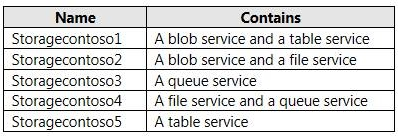

You have an Azure subscription that contains the storage accounts shown in the following table.
You enable Azure Advanced Threat Protection (ATP) for all the storage accounts.
You need to identify which storage accounts will generate Azure ATP alerts.
Which two storage accounts should you identify? Each correct answer presents part of the solution.
NOTE: Each correct selection is worth one point.

looker
Highly Voted 5 years, 8 months agotartar
4 years, 9 months agoVK
Highly Voted 5 years, 7 months agoazurecert2021
Most Recent 4 years, 5 months agoazurecert2021
4 years, 5 months agoAhmedAL
4 years, 8 months agoanishk
4 years, 9 months agomacco455
4 years, 10 months agoChanderM
4 years, 11 months agoChanderM
4 years, 11 months agoChanderM
4 years, 11 months agopraveen97
4 years, 11 months agogboyega
4 years, 11 months agoRooh
4 years, 12 months agothirstylion
5 years agokondapaturi
5 years agovictorin
5 years, 1 month agoRajuuu
5 years, 2 months agolevm39
5 years, 5 months agoEkramy_Elnaggar
5 years, 6 months agokailash
5 years, 2 months ago